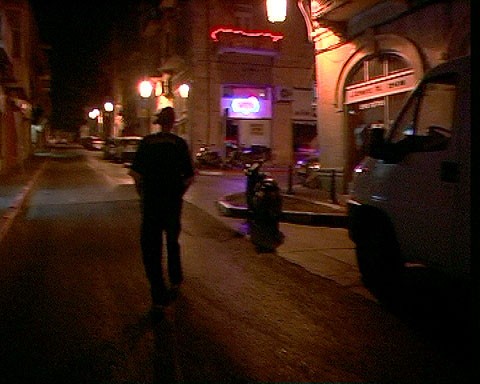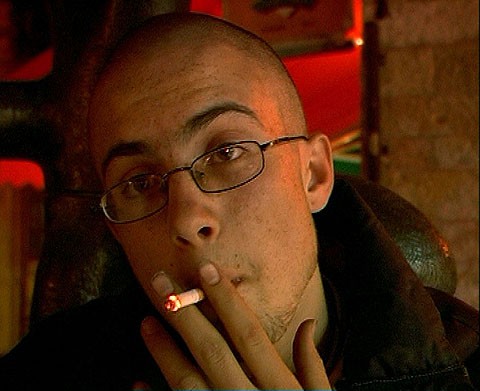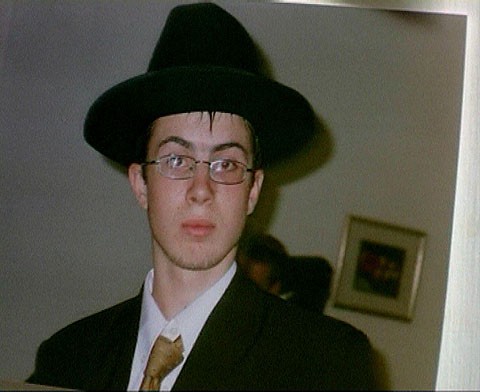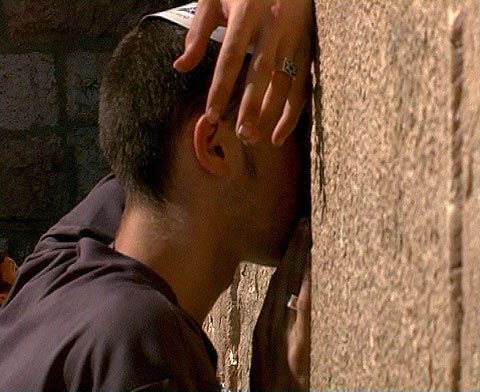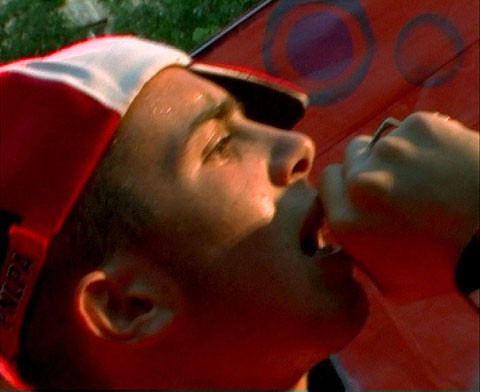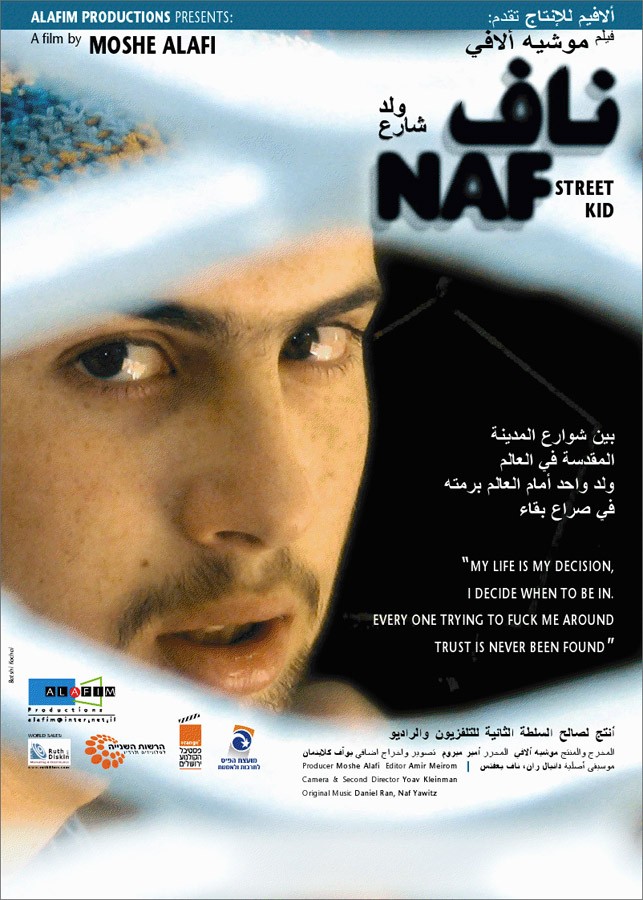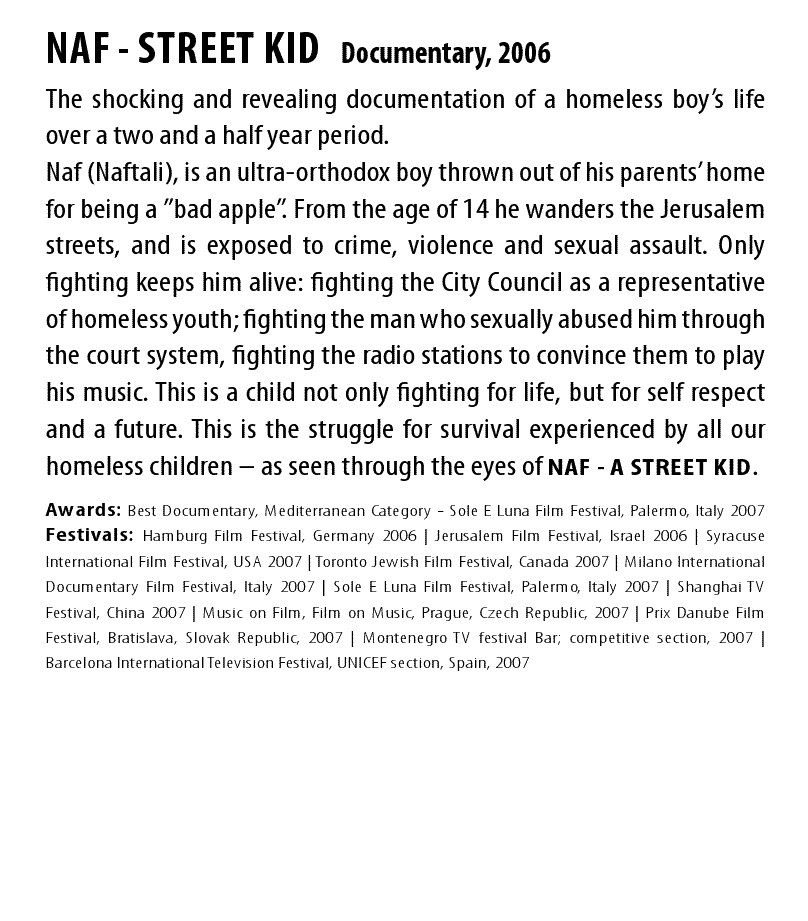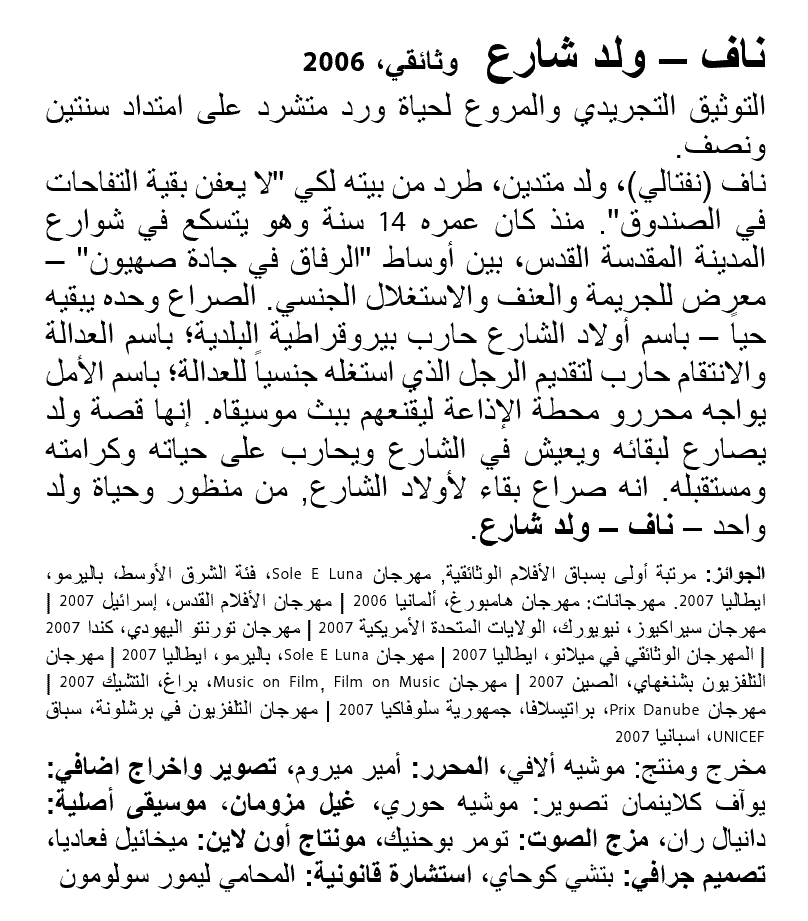The shocking and revealing documentation of a homeless boy's life over a two and a half year period. Naf (Naftali), is an ultra-orthodox boy thrown out of his parents' home for being a "bad apple". From the age of 14 he wanders the Jerusalem streets, and is exposed to crime, violence, and sexual assault. Only fighting keeps him alive; fighting the city council as a representative of homeless youth; fighting the man who sexually abused him through the court system, fighting the radio stations to convince them to play his music. This is a child not only fighting for life, but for self respect and a future. This is the struggle for survival experienced by all our homeless children – as seen through the eyes of NAF – a street kid.
Synopsis
The shocking and revealing documentation of a homeless boy's life over a two and a half year period. Naf (Naftali), is an ultra-orthodox boy thrown out of his parents' home for being a "bad apple". From the age of 14 he wanders the Jerusalem streets, and is exposed to crime, violence, and sexual assault. Only fighting keeps him alive; fighting the city council as a representative of homeless youth; fighting the man who sexually abused him through the court system, fighting the radio stations to convince them to play his music. This is a child not only fighting for life, but for self respect and a future. This is the struggle for...
Awards
- Best Documentary Award of the Mediterranean Film Category – Sole e Luna International Film Festival, Palermo, Italy
Festivals
- Beit Tzedek Congregation, Toronto, Canada, 2011
- Camp Ramah, Canada, 2011
- Abruzzo Int'l Documentary Film Festival, Italy, 2009
- Isratim Film Festival, Paris, 2009
Press & Links:
Naf: A Street Kid
Thrown out of his haredi parents’ house at 14 because he cut his sidelocks and wore jeans and a T-shirt, Naf lives on the streets of Jerusalem, smoking—and occasionally selling—dope and trying to make it as a rap artist. Angry and cocky, Naf claims to represent hundreds of other street kids in their struggle for aid against what they see as oppressive social structure. Moshe Alafi’s documentary, which is neither pretty nor upbeat, follows Naf for two and a half years. It’s certainly not the picture of Jerusalem the Golden seen in travel brochures. Ruth Diskin Films (www.ruthfilms.com ). —Renata Polt"The film is not an investigation into the issue of the some 39,000 abused and neglected street kids in Israel. Though it is a documentary on street life, there are no interviews with government officials, social workers or many other street kids. Through Naf’s story, Alafi conveys the message that without something to open our eyes to the higher possibilities of life, we might all be Nafs."
For the entire review by Dave Godon/The Canadian Jewish New, click here
Why Does Naftali Live in the Street?10 Adar 5767, 28 February 07 09:51
by David Ha'ivri
(IsraelNN.com) "Naf" (short for Naftali) was quite young when he started to drift away from the Haredi (religious) world. He came from a typical Haredi family and neighborhood, a successful student in a Talmud Torah school, receiving prizes from his rabbi for memorizing volumes of Mishna. There was no Internet or TV at home, just an inner uneasiness that slowly pushed him into the "margins".
At the beginning, he was in and out of different yeshivas. Later, depression set in, followed by a few unsuccessful attempts to put an end to his confusion via suicide. During Naftali's metamorphosis from ultra-Orthodox to secular Jew, the straw that broke the camel's back, as far as his parents were concerned, was when he came home without the traditional Haredi uniform, earlocks shaved off, wearing jeans and a T-shirt. This was more than his father could deal with, fearing he might be a bad influence on his younger si! blings. At only 14 years old, Naftali was beaten by his father and thrown out of his home, told not to return.
Naftali found himself living on the streets in and around Zion Square in the center of Jerusalem. Sometimes, he rented a place with other youth with money received from Christian missionaries. For pocket money, he stole from the pockets of others or earned cash from drug deals on the street.
Naf's life was filmed for over two years by filmmaker Moshe Alafi, who documented his life and made it into an 80-minute documentary called Naf: A Street Kid. The background music in the film is original music by Naf himself, who has become a bona fide rapper, rhyming simultaneously in both Hebrew, English and Yiddish. In his music, Naf tells the stories of his own misfortune and that of many other kids who live on the street in Jerusalem. They are tales about kids cut off from their fa! milies, tales of drug abuse, tales of their battles with the establishment social workers, courts and police, tales of rape and exploitation by sick individuals who take advantage of their miserable situation.
The story of Naf should serve as a wake-up call to parents and educators. Why is Naf and many others like him on the street? If it happened to them, could it not happen to us? He, of course, is just one example and his case shows certain characteristics that might be different in other cases. There are kids on the streets who had good relations with their families, who were successful at school, but for other reasons drifted to the gutter. Why? And what can be done to protect others from falling into the dark pit?
Moshe Alafi's film Naf was viewed by youth and adults in our town and in other towns nearby, in order to serve as an eye opener and to bring forth public debate on th! is difficult issue. It is not a nice scene - some parts are vulgar and offensive. But it is real and close to us. Some people in the community opposed the viewing of the film, and would rather not be exposed to the sights and voices of the "other side." But others hold that it is better that we and our youth know exactly what the dangers are, in order to protect ourselves from them.
I agree that this is not a fun issue to deal with. Sometimes, it is better to an ostrich that could put one's head in the ground when something scary lies ahead. But we are not ostriches. There is a real threat to our youth and we must deal with it. In order to fight the enemy, we must first acknowledge that there is a problem. In such a case, it is prudent to learn who and what the enemy is.
Naf: A Street Kid ***
Moshe Alafi's documentary about a rebellious Israeli teen, thrown out of his ultra-orthodox home onto the Jerusalem streets at the age of 14, is a gritty, incisive portrait shot over a two-and-a-half-year period. Although initially Naf (short for Naftali) appears surly and rude, he becomes increasingly sympathetic as the film details the often dangerous circumstances faced by homeless kids. One of the narrative threads here focuses on Naf's effort to prosecute a man he accuses of molesting him (an effort frustrated by repeated judicial postponements), while another deals with his attempt to convince city authorities to recognize him as a spokesman for street kids so that he can lobby for improved government services. On a less intense note, Naf is seen performing his songs, which he is also trying to record and release. The film takes a somewhat positive turn when Naf is sentenced to serve time in juvenile detention, since the
lockup will give him a chance at kicking his drug habit; in addition, he reestablishes contact with his mother and sees his abuser convicted. Naf neither romanticizes its subject nor is unduly pessimistic; rather, it's an honest depiction of the desperation that can take hold of a street kid like Naf-one that ultimately holds out hope.
Reviewed by the Video Librarian, April, 2007
About a boy - An article by Tamar Rotem
(Published on Haaretz weekend newspaper, 7/7/2006)
" This is a little street kid, fighting against the whole world
He has long since burned life, he remains a drug addict "( from a poem written by Naf )
Naf sits on the narrow balcony of his home in one of the ultra-Orthodox neighborhoods in Jerusalem , smoking and gathering his thoughts. He is a restrained type, he measures his words, he does not give of himself; Naf broadcasts something defeated even when he sings in a low voice one of his aggressive rap songs, which usually deal with drugs and with children dying in the streets. The words and the tune have not changed, so what has happened to the charismatic and defiant boy who three years ago organized a demonstration of hundreds of street children in Zion Square ?
Naf, short for Naftali Javetz, aged 18, is the hero of the drama of his life . A boy who has lived in the streets from the age of 14, who has been raped , stabbe d, who has smoked soft drugs and recently was also arrested and tried for drug dealing. As if all that were not enough for one boy, he has conducted battles for street youth, fought in the courts to bring the man who assaulted him to judgment, and finally insisted on fulfilling his dream - to become a rapper, to perform and to become famous .
He is also the hero of the documentary film "Naf - Street Kid" by director Moshe Alafi, which will be screened on Sunday at the Jerusalem Film Festival . Alafi h as accompanied Naf from that demonstration in Zion Square until he was sent to the closed youth village of Malkishua in the Gilboa. He filmed him over three years, during which Naf lived in the streets or wandered among neglected apartments and youth clubs belonging to missionaries or to Chabad. Three years of smoking "bangers," as one sees endlessly in the film .
At present Naf lives in the home of his mother, who is supporting him after several years when contact was severed. But cut! It's not a happy end. Naf is not simply at home. He is under house arrest after being suspected of drug dealing, and after he escaped from the Retorno Jewish Center for Prevention and Treatment of Addictions for religious youth, near Beit Shemesh .
In the film Naf looks like his trademark: charismatic, deceptive and charming, with a thousand faces and hairdos. One minute he is manipulative, a tireless consumer of attention, and the next he is exceptionally candid. In life, Naf looks simply like an aging boy, whose battles have vanquished him .
Thrown out
Naf was born to an ultra-Orthodox family in Jerusalem , to newly religious English-speaking parents. He is the fourth of nine children. At the age of 13 , when he was studying in an Orthodox elementary school, he became a "shababnik " ( a nickname for ultra-Orthodox youth who drop out of school). "I started to cause problems," he says. "I stole from stores with friends. I didn't want to be religious." His parents asked no questions, and threw him out of the house . " They were afraid I would influence my younger siblings," he says dryly .Naf was sent by the welfare authorities to foster families, but he didn't get along in any of the homes. His father, who in his youth had been a hippie in the United States , would not agree to any deviation from the education he had planned for his son. His mother did not yet have a voice to oppose her husband and to support her son, as she did in the end. Meanwhile, Naf was accepted - conditionally - to study in a yeshiva in Jerusalem . The head of the yeshiva insisted he not return to his old neighborhood, so that he wouldn't hang out with the boys who had a bad influence on him .
After Naf was expelled from one of the foster families, his father received a proposal from an acquaintance, an ultra-Orthodox producer, to host Naf in his home. "I was a handsome boy," says Naf. "When I was 11 years old this producer asked to photograph me for an album of rabbis. He made an entire book for me and already then touched me, but I didn't understand." Naf stayed with the producer for two weeks, and was assaulted by him .
After the assault he went to live in the street. A year and a half later, at the age of 14, Naf complained to the police about the rape. The assailant was sentenced to eight months in prison and fined NIS 5,000 .
Director Moshe Alafi heard about Naf by chance. He came to Hut Hameshulash, a Chabad club for street youth. He was horrified when he saw the boys there - most of them homeless. Alafi arrived there just on the evening when they were celebrating Naf's birthday .
" He had amazing self-confidence," says Alafi. "They told me this boy was about to hold a demonstration on Zion Square to protest the attitude of social workers, and the fact that the youth were treated under duress. I immediately knew there was a story here." He says Naf stood out among the boys and girls who found themselves in the street as a stage in their lives and as a youthful rebellion. "Naf is a youth at risk, for whom life in the street is the essence of his life," he says .
Lost faith
The demonstration on Zion Square , which was held in February 2004 in stormy winter weather, was extensively covered in the media. Naf was interviewed and spoke against the social workers and against being treated under duress. He demanded a different attitude from the establishment. On the eve of the demonstration he wrote to Jerusalem mayor Uri Lupolianski: "I am turning to you as the representative of youth in distress in Jerusalem ," and asked him to attend the demonstration. But the mayor did not come. At the end of the demonstration, Naf and about another 20 homeless youth settled down with their sleeping bags in Safra Square , in front of City Hall .
In the wake of the demonstration, Naf was invited to meetings with members of the city council and with MKs. He came to the meetings equipped with a detailed program for an appropriate solution for homeless youth, which spoke of building a house - as was done in Haifa - in which the youth would study, work and sleep . But nobody took him seriously .
As time passed, the enthusiasm of his friends died, and they returned to their daily routine of survival. In the film he reads a letter from the mayor in which he is told that he is not a representative of the youth, as he claimed . And that the homeless youth in the city are satisfied with the treatment given to them by the municipality. Defeated, he stopped the struggle .
He was also defeated in the conduct of his legal affairs. In his opinion, the State Prosecutor did not treat him properly: The trial of the attacker continued for three years, and Naf suffered many disappointments. Although he attended all the proceedings, he claims the prosecutors did not bother to inform him when they were postponed. Naf also thinks the punishment was too mild. Alafi says Naf's deterioration began when he lost faith in the legal system. "In the end he collapsed," says Alafi .
During the same period, he was uplifted by the songs he wrote. With the help of good people from the ultra-Orthodox club Zone, he succeeded in recording a single and putting on a few rap performances. But Army Radio did not accept the songs for broadcasting. Another disappointment .
Naf changes identities in every scene in the film. Once he looks like a strange Bratslav Hasid with a large black skullcap on his head, once he is a clubber, once he is a drug addict (although he says he has never used hard drugs) and in the end a yeshiva student .
A few months ago, Naf was arrested and five criminal files were opened against him for the crime of dealing in hashish. Naf claims that someone who sold him drugs framed him. Naf was send to the Malkishua institution, but fled from there. Afterwards he was sent to Retorno, a stricter framework, and fled from there as well. Now he is under house arrest, waiting for a court discussion of his case. He claims he is drug-free and does not want to think what will happen if he is sent to prison .Festivals
- Beit Tzedek Congregation, Toronto, Canada, 2011
- Camp Ramah, Canada, 2011
- Abruzzo Int'l Documentary Film Festival, Italy, 2009
- Isratim Film Festival, Paris, 2009
- Zlin International Children & Youth Film Festival, Czech Republic, 2008
- Music Documentary Film Festival, Sweden, 2008
- International Children Day - Israeli Parliament, November, 2007
- Special Screening at the Israeli Parliament Marking Int’l Children Day, November 19th, 2007
- Barcelona International TV Festival, Spain, 2007
- Montenegro Int’l TV Festival – Competitive Section, 2007
- Music on Film – Film on Music International Film Festival, Prague, Czech Republic, 2007
- Prix Danube International Film Festival, Slovak Republic, 2007
- Parnu International Film Festival, Estonia, 2007
- Milano International Film Festival, Italy, 2007
- Palermo Mediterranean Film Festival, Italy, 2007
- Shanghai International TV Festival, China, 2007
- Toronto Jewish Film Festival, Canada, 2007
- The Hungarian Film Archive, Budapest, 2007
- Syracuse International Film Festival, USA, 2007
- Hamburg International Film Festival, Germany, 2006
- Jerusalem Film Festival, 2006
Educational
- Duke University
- Makor Jewish Library, Australia
- Ohio State University
- Yale University
- Harvard University
- University of Maryland
Awards
- Best Documentary Award of the Mediterranean Film Category – Sole e Luna International Film Festival, Palermo, Italy
